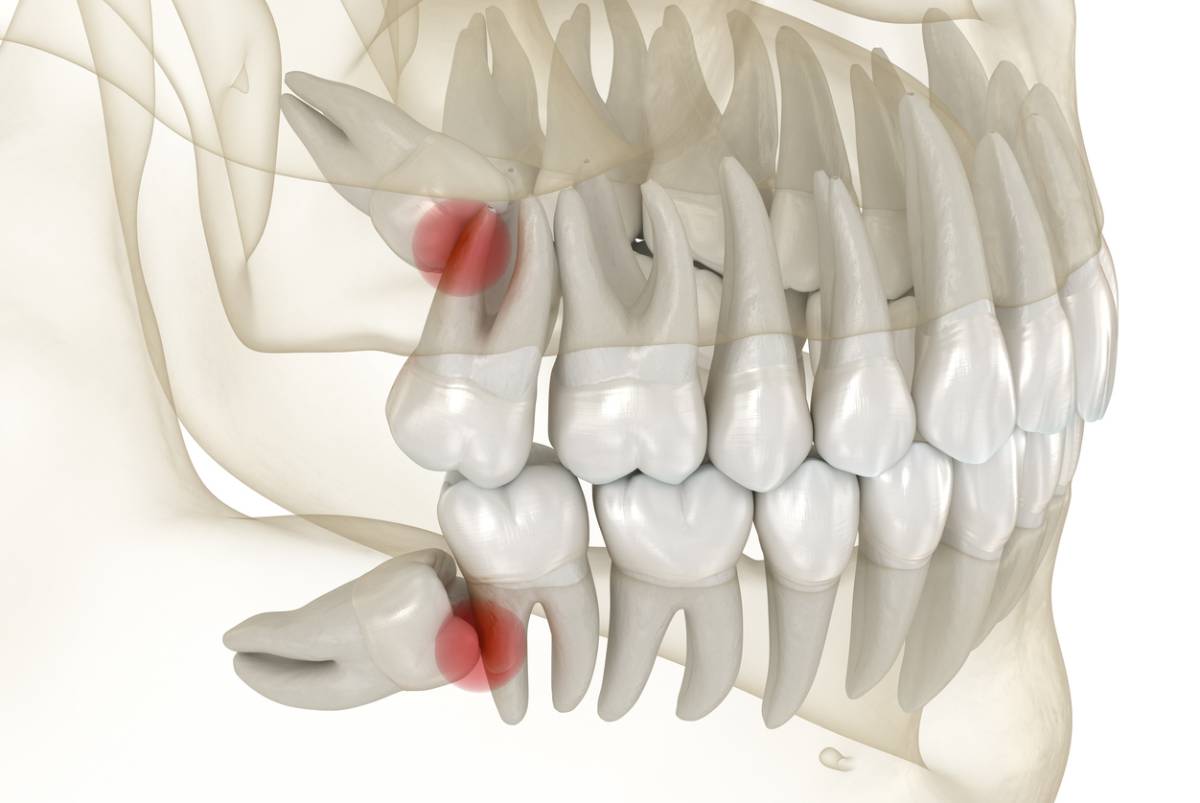Most people get their wisdom teeth between the ages of 17 and 25. Sometimes the process can be smooth and for others it can be more painful. You may wonder, why do wisdom teeth cause pain? Below you find out why you may experience pain when your wisdom teeth come in, and what you should do about it.
Why Do Wisdom Teeth Cause Pain?
For some people, their wisdom teeth erupt and fit perfectly in their mouth without any real issues. However, it can be quite different for others. Wisdom teeth can cause pain and other unwanted symptoms when they come in. The most common reason for wisdom tooth pain is a lack of space for them to come in properly.
Wisdom teeth are the third set of molars that come in. If there isn’t enough space from them in your mouth, it can lead to impaction. An impacted tooth can be partially or completely trapped in your gums and jawbone. This can cause pain, swelling, and even an infection if not addressed right away. Another reason you may experience pain when your wisdom teeth come in is because they don’t completely fit. The pressure on your surrounding teeth can cause pain, swelling, and other unwanted symptoms.
Symptoms of Impacted Wisdom Teeth
While impacted wisdom teeth often come with symptoms, there are some cases where they may not cause any. This is why it is important to regularly visit the dentist. Your dentist in Montclair will be able to identify your wisdom teeth coming in even if you don’t have any symptoms.
If you do have symptoms, contact a dentist right away. You likely need a wisdom teeth extraction in Montclair. Common symptoms of impacted wisdom teeth include red or swollen gums, tender or bleeding gums, jaw pain and swelling, bad breath or an unpleasant taste in your mouth, or difficulty opening your mouth. Avoid waiting as there are serious consequences to avoiding wisdom tooth removal.
Complications With Impacted Wisdom Teeth
Impacted wisdom teeth can cause serious issues if left untreated. If you experience any of the symptoms associated with impacted wisdom teeth, contact a dental professional right away.
- Gum Disease: Impacted wisdom teeth can lead to gum disease. Gum disease is a harmful oral health issue that can lead to gum recession, tooth loss, and other harmful dental issues. An impacted wisdom tooth can be really difficult to clean. This can lead to a buildup of plaque and bacteria. This can seriously impact your gum tissue as it can lead to inflammation and an infection.
- Tooth Decay: Similar to gum disease, an impacted wisdom tooth can lead to decay. This is due to the difficulty associated with cleaning an impacted wisdom tooth. The buildup of plaque, bacteria, and leftover food can cause decay. If left untreated, it can lead to a number of other oral health issues.
- Tooth Damage: Impacted wisdom teeth can damage your surrounding teeth. It can damage your second molar and increase the risk for infection in that area. The pressure can also cause overcrowding if there isn’t enough space. This can impact the alignment of your teeth if not taken care of right away.
Can You Prevent Impaction?
You can’t prevent impaction and you cannot prevent your wisdom teeth from coming in. However, attending your regular dental appointments every six months can help your dentist monitor your oral health. Your dentist can take X-rays at your regular dental checkups. This can allow your dentist to see if you have impacted wisdom teeth before any symptoms develop.
If you need to schedule your next dental appointment, contact the team at Monte Vista Dental Group. They are skilled in wisdom teeth removal and other dentistry services. If you are experiencing any of the symptoms related to impacted wisdom teeth, contact their team right away to schedule an appointment. The risks associated with waiting can lead to more severe dental issues.

